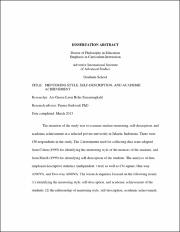Mentoring style, self-description, and academic achievement
Abstract
The intention of the study was to examine student mentoring, self-description, and
academic achievement in a selected private university in Jakarta, Indonesia. There were
150 respondents in the study. The 2 instruments used for collecting data were adopted
from Cohen (1995) for identifying the mentoring style of the mentors of the students, and
from Marsh (1999) for identifying self-description of the students. The analysis of data
employed descriptive statistics (independent t test) as well as Chi square, One-way
ANOVA, and Two-way ANOVA. The research inquiries focused on the following issues:
(1) identifying the mentoring style, self-description, and academic achievement of the
students; (2) the relationship of mentoring style, self-description, academic achievement,
and demographic profiles; and (3) the interactive effects—individual and joint—of
mentoring style, self-description, and student academic achievement.
The following are the findings of the study: First, students perceived that 2
mentoring styles are predominant among their mentors: relationship emphasis and mentor
model; students perceived themselves with a self-description focused on spiritual values;
and students had high academic performance. Second, both male and female students
perceived similar mentoring styles among their mentors, while, 1st year and 2nd year
students perceived mentoring style to be different among their mentors. In selfdescription,
differences were found between genders while there was no difference found
between 1st and 2nd year students. There was no difference found between gender and
year of study in the academic achievement, the students showed high performance. Third,
mentoring style and self-description did not have a significant individual or joint
difference on academic achievement. Since the students, as a whole had high academic
achievement, this study seems to suggest that the different mentoring style did not have a
difference on their academic achievement. However, that did not mean that mentoring did
not work. On the contrary, it seems that mentoring, regardless of style—based on the high
academic achievement scores—does work. However, there is also the possibility that
high achieving students may not need mentoring for improving their academic
achievement.


